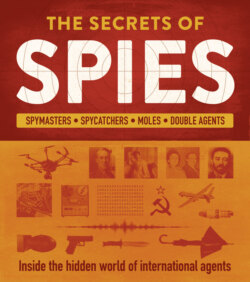Читать книгу The Secrets of Spies - Weldon Owen - Страница 33
На сайте Литреса книга снята с продажи.
ОглавлениеCHAPTER 2 | 1600s–1800s
34
SPYING IN
THE ENGLISH
CIVIL WAR
During the English Civil War (1642–1649), Oliver
Cromwell’s Parliamentary forces held the military
advantage over the Royalists under Charles I.
Unlike Charles, Cromwell understood the
importance of good intelligence, employing the
best spies to undermine the efforts of his enemies.
The Parliamentarians were able to call upon the services of
John Wallis, a scholar at Cambridge University. Like many
other cryptographers, Wallis was a brilliant mathematician (he
also developed infinitesimal calculus). For him, codebreaking
was an amusing intellectual diversion, and he had little
difficulty untangling the codes used by the Royalists.
THE KING’S LETTERS
In 1645, Wallis deciphered the coded correspondence of
Charles I to his wife in exile in France, as well as plans to
encourage support from Catholics in Ireland and continental
Europe. These letters were an invaluable propaganda coup
for Parliament, who published their contents in order to
discredit Charles. Firstly, they portrayed him as a king ruled
by his wife, and secondly, they showed that a supposedly
Protestant king was engaging in deals with foreign Catholics.
Wallis later worked for Thomas Scot, Oliver Cromwell’s
first intelligence chief. Appointed in 1647, Scot developed
a spy network that infiltrated the Royal court-in-exile on the
outskirts of Paris. One of his secret agents, Robert Werden,
provided juicy details of the affairs of the royal princes Charles
and James, much to the consternation of the straitlaced Scot.
“REALLY IT IS A WONDER THAT YOU CAN PICK
AS MANY LOCKS LEADING INTO THE HEARTS
OF THE WICKED MEN AS YOU DO, AND IT IS A
MERCY THAT GOD HAS MADE YOUR LABORS
THEREIN SO SUCCESSFUL.”
Henry Cromwell (son of Oliver), writing to John Thurloe
Right:
Oliver Cromwell
Above: Charles I and his wife
Henrietta Maria of France
